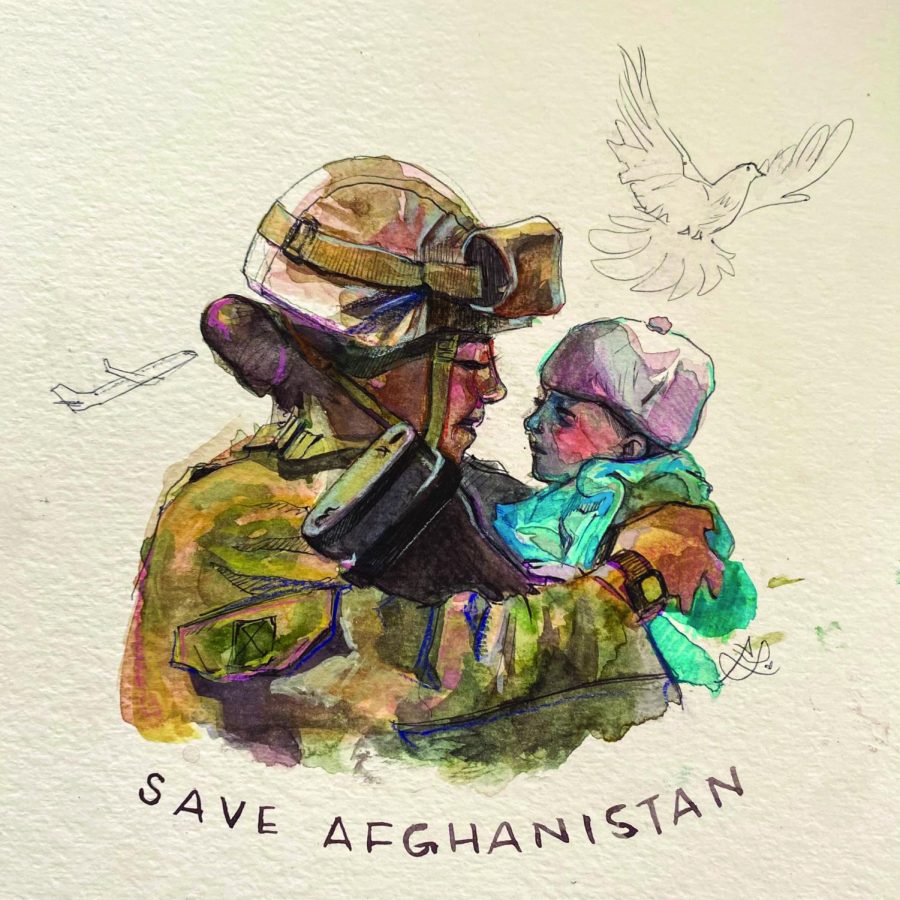U.S. troops exit from Afghanistan
After 20 years of involvement with the country, the United States withdrew its troops from Afghanistan on Aug. 30. What does this mean for the world?
September 30, 2021
The United States’ longest war drew to a close on Aug. 30. After 20 years of involvement in Afghanistan, U.S. troops withdrew from the embattled country.
Afterward, the Taliban terrorist group invaded and took power in Kabul, Afghanistan’s capital. Tens of thousands of people evacuated the country. Kabul International Airport soon became a scene of chaos as thousands gathered on the tarmac and Afghani civilians clung to the sides of American military planes in an effort to escape.
An attack on the airport by the Taliban left dozens dead, including 13 active United States military personnel.
Pundits and journalists criticize the manner in which the Biden administration handled the exit from Afghanistan. Others argued that after 20 years of American involvement without a stable government to show for their efforts, a takeover from the Taliban was inevitable.
“It’s really complicated; I felt very disappointed that we were leaving and not able to help as much as we wanted to,” said Upper School teacher and veteran, Dr. Andre Stipanovic. “On the other hand, if we can’t accomplish anything more, we’re sacrificing our own people, our own resources. At some point we can’t occupy their country forever.”
American involvement in Afghanistan was sparked by the attack on the Twin Towers on Sept. 11, 2001. Following the death of almost 3,000 people, President George Bush vowed to win the war against terrorism. Weeks later, the United States invaded Afghanistan.
Taliban strongholds began to crumble in November 2001, and the United Nations looked to establish a strong democratic government in Afghanistan.
Experts estimate the United States has spent over $2 trillion in humanitarian and governmental efforts in Afghanistan since the beginning of the country’s involvement in Afghanistan.
Despite these efforts, no stable government has been established as the country struggled with the installation of a transitional government that produced no strong long-term leader.
“After 20 years, if there was not a stable government established, the question then arises: How long do we stay until there is an effective government?” Upper School history teacher Dr. Keith Clark said.
Following a near total collapse in the early 2000’s, the Taliban regained traction and influence in the Middle East over the past several years. The terrorist organization stormed Afghanistan, reaching the capital city of Kabul on Aug. 30, two weeks before President Biden’s deadline for the removal of all American troops from the country.
Roughly 1,000 Americans still await evacuation from the country as the United States government struggles to remove them as the Taliban have taken over the Kabul International Airport.
The establishment of a Taliban government in Afghanistan marks a humanitarian crisis. The Taliban operate based on an extremist interpretation of the Quran, enforcing their law with brutal public displays of violence and mass executions. They also strongly impose the subjugation of women, including banning women from any form of education.
According to the United States Refugee Agency:
“There are 2.6 million registered Afghan refugees in the world… Another 3.5 million people are internally displaced, having fled their homes searching for refuge within the country. In light of the rapidly deteriorating security situation in 2021, the number of people fleeing will likely continue to rise.”
On Sept. 7, the Biden administration called for Congress to pass $10 billion in humanitarian assistance for incoming Afghan refugees. A White House official said the budget would cover plans for over 65,000 Afghans fleeing to the United States by the end of September, and an additional 30,000 over the next 12 months.
The International Rescue Committee has stepped up in light of this recent crisis to settle Special Immigrant Visa holders around the United States.
“Right now in Dallas, our local branch of the IRC is working to welcome Afghan newcomers into our city,” said senior Leena Mehendale, president of the Social Impact Board. “Hockaday students can help by donating directly to the IRC Dallas Wishlist, volunteering to sort and deliver donations and help with office administration.”










